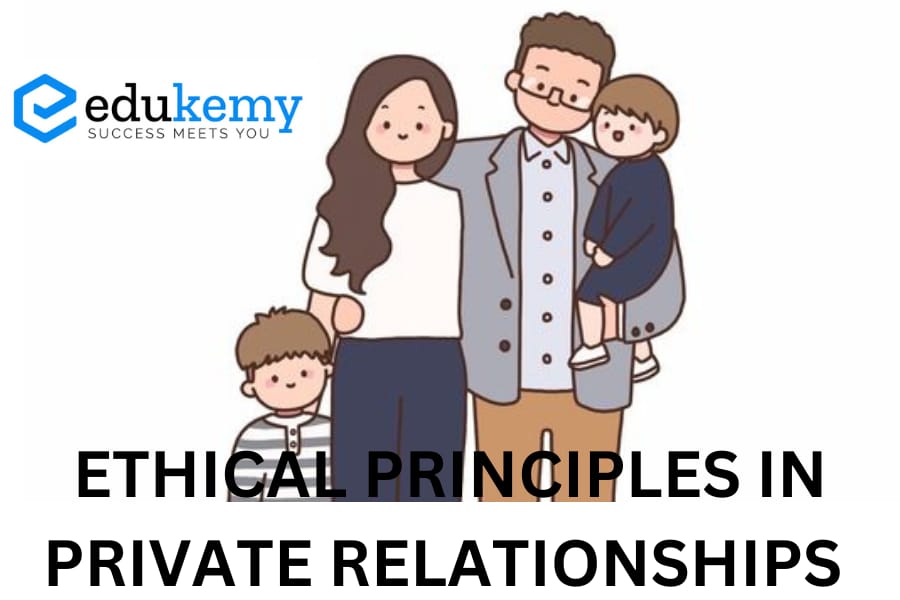
Ethical principles in private relationships serve as the foundation for healthy interactions and mutual respect among individuals. Unlike public or professional relationships, private relationships often involve deep emotional connections and personal vulnerabilities. Therefore, understanding and upholding ethical principles is essential to foster trust, empathy, and harmonious coexistence.
In this context, ethical principles guide individuals in navigating complex moral dilemmas, resolving conflicts, and maintaining integrity in their interactions. These principles encompass various aspects of human behavior, including honesty, respect for autonomy, fairness, empathy, and compassion.
In private relationships, individuals must recognize the inherent dignity and worth of each person involved. This acknowledgment forms the basis for treating others with respect and dignity, regardless of differences in opinions, beliefs, or backgrounds.
Moreover, ethical principles underscore the importance of honesty and transparency in communication. Open and truthful dialogue fosters trust and strengthens the foundation of relationships, enabling individuals to express their thoughts, feelings, and needs authentically.
Respect for autonomy is another fundamental ethical principle in private relationships. It entails recognizing each person’s right to make independent choices and decisions concerning their lives. Respecting autonomy involves refraining from coercion or manipulation and honoring individuals’ right to self-determination.
Fairness and justice are also integral components of ethical relationships. Fairness involves treating others impartially and equitably, considering their needs and perspectives in decision-making processes. Upholding principles of justice entails addressing power imbalances and advocating for equality and inclusivity within the relationship dynamic.
Empathy and compassion play significant roles in fostering empathy, understanding, and support in private relationships. Empathy involves the ability to understand and share others’ feelings, fostering deeper connections and emotional intimacy. Compassion entails showing kindness and concern for others’ well-being, especially during times of difficulty or distress.
In summary, ethical principles in private relationships provide a moral framework for cultivating healthy, fulfilling connections based on trust, honesty, respect, fairness, empathy, and compassion. By upholding these principles, individuals can navigate the complexities of human interaction with integrity and sensitivity, enriching their relationships and promoting personal growth and fulfillment.
Contents
- 0.1 Care and Affection
- 0.2 Fidelity
- 0.3 Truthfulness
- 0.4 Responsibility & Accountability
- 0.5 Tolerance and acceptance of minor imperfections
- 1 FAQs
- 1.1 Q: What role does trust play in private relationships?
- 1.2 Q: How can conflicts be resolved ethically in private relationships?
- 1.3 Q: Why is respect for autonomy important in private relationships?
- 1.4 Q: How do ethical principles address power dynamics in private relationships?
- 1.5 Q: What role does empathy play in maintaining healthy private relationships?
- 2 In case you still have your doubts, contact us on 9811333901.
Care and Affection
Emotional bond of affection and care goes beyond limitations
This bond is driven by human emotions rather than legal rules or quid pro quo
● Example: King Dhritrashtra’s unconditional affection for his sons in Mahabharata
Fidelity
Key driver of marital relationship and essence of Ethics of marriage
Refers to being loyal to one’s life partner and avoiding sensual distraction or committing adulterous act
Confidentiality
Secrecy and privacy are of paramount importance to maintain sanctity of private relationships
● Example: restraining oneself from sharing secrets of friends, colleagues, life partners without their
permission to avoid disharmony
Truthfulness
Key demand in private relationships
Amplifies mutual trust and strengthens emotional bonds
● Example: being truthful to avoid unnecessary conflicts arising from alleged suspicious activities
Responsibility & Accountability
Various responsibilities towards children, life partners, parents, etc.
Requires fulfilling responsibility and being accountable in case of non-fulfilment
● Example: taking care of one’s children and being accountable to them
Tolerance and acceptance of minor imperfections
Human beings cannot achieve perfection, leading to conflicts in private relationships in the absence of
prescribed rules and regulations
One must accommodate the imperfections of others to bring peace and harmony
● Example: tolerating one’s partner’s introverted nature for a peaceful marital life.
FAQs
Q: What role does trust play in private relationships?
Trust is the cornerstone of private relationships, as it forms the basis for emotional intimacy and mutual reliance. Without trust, individuals may feel insecure and apprehensive, leading to conflicts and disconnection. Building and maintaining trust involves consistent honesty, reliability, and integrity in actions and communication.
Q: How can conflicts be resolved ethically in private relationships?
Ethical conflict resolution in private relationships involves active listening, empathy, and compromise. It’s essential to respect each other’s perspectives, refrain from personal attacks, and seek mutually beneficial solutions. Honoring the dignity and autonomy of all parties involved is crucial, even amid disagreements.
Q: Why is respect for autonomy important in private relationships?
Respect for autonomy acknowledges individuals’ right to make independent choices and decisions about their lives. It fosters empowerment and self-expression, promoting a sense of agency and dignity within the relationship. Respecting autonomy also cultivates trust and encourages open communication and collaboration.
Q: How do ethical principles address power dynamics in private relationships?
Ethical principles advocate for equality, fairness, and inclusivity, addressing power imbalances that may exist within private relationships. It’s essential to recognize and mitigate disparities in influence or control, ensuring that all individuals have a voice and agency in decision-making processes. Promoting mutual respect and shared responsibility helps create a more balanced and harmonious dynamic.
Q: What role does empathy play in maintaining healthy private relationships?
Empathy fosters understanding, emotional connection, and validation of each other’s experiences and feelings. It enables individuals to navigate conflicts with sensitivity and compassion, enhancing emotional intimacy and mutual support. Cultivating empathy involves active listening, perspective-taking, and showing genuine care and concern for each other’s well-being.
In case you still have your doubts, contact us on 9811333901.
For UPSC Prelims Resources, Click here
For Daily Updates and Study Material:
Join our Telegram Channel – Edukemy for IAS
- 1. Learn through Videos – here
- 2. Be Exam Ready by Practicing Daily MCQs – here
- 3. Daily Newsletter – Get all your Current Affairs Covered – here
- 4. Mains Answer Writing Practice – here

